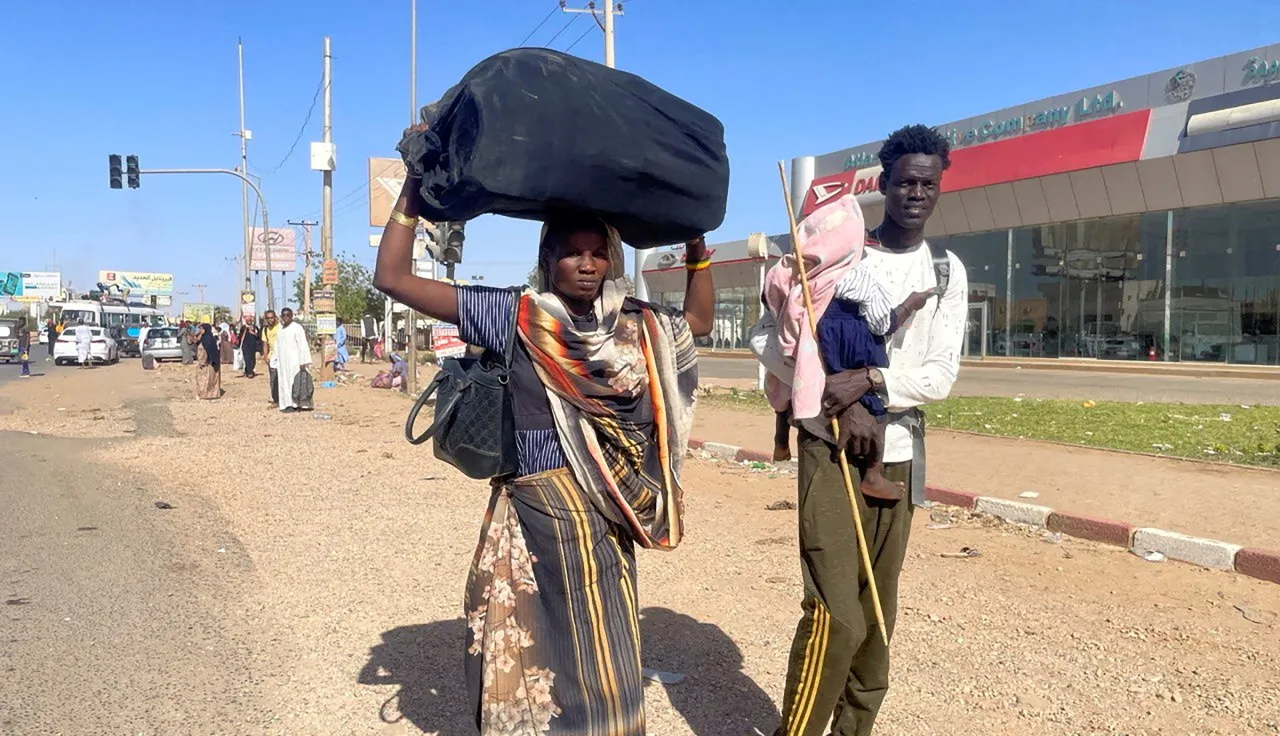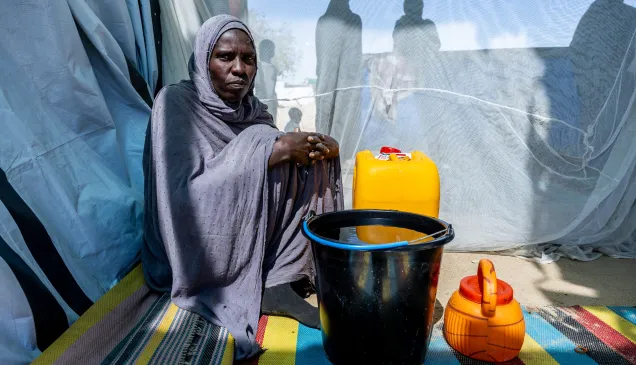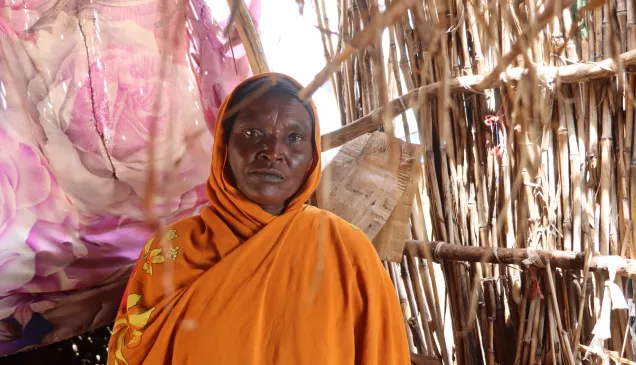Sudan: We need your help to protect families caught up in conflict

The situation in Sudan took a terrifying turn on April 15, as fighting erupted, forcing civilians to seek shelter from the heavy fighting that has raged on for weeks.
Nearly three months since the conflict broke out in Sudan, the humanitarian situation is dire. The intense fighting has been taking place in densely populated urban areas where essential services including banks have been disrupted. Thousands of civilians have already been killed or injured. Civilians in Khartoum and Darfur are facing serious food and water shortages, and more than a million people fled their homes. Many of them lost contact with their loved ones.
Healthcare may collapse at any moment despite the best efforts of Sudanese doctors and nurses, who have continued working in extremely difficult conditions, caring for the wounded, and providing other essential healthcare services to the population.
They face severe shortages of water, power, food and are running critically low on essential medical supplies.
"Only 20% of health facilities in Khartoum are still functioning, a true collapse of the system right when it's needed the most," said Alfonso Verdu Perez, the head of the ICRC delegation in Sudan.
A shipment of 8 tons of emergency medical supplies arrived in Khartum on 25 May. These supplies were distributed to seven hospitals and include anesthesia and antibiotics among other medications, dressings, sutures and infusions that can treat hundreds of people severely wounded by weapons.
Since the start of the fighting, thousands of people have been displaced within Sudan's borders, and tens of thousands more have found refuge in neighboring countries such as South Sudan, Ethiopia, Egypt, Chad and the Central African Republic.
"Our homes have been burnt, destroyed. We need everything."
Awa Essa recalls how she fled the fighting in #Sudan. pic.twitter.com/FjpKY2zyTf— ICRC (@ICRC) May 19, 2023
This latest flare-up of violence comes on top of years of fighting, instability, and economic turmoil that has left millions of Sudanese unable to meet their basic needs. These needs will now tragically rise.
We continue calling, bilaterally and publicly, on all parties to the conflict to respect their obligations under international humanitarian law. This includes taking all feasible precautions to avoid civilian injuries and loss of life, treat detainees humanely and provide the necessary humanitarian space for the first responders to be able to care for the wounded and collect dead bodies in a dignified manner.
We are deeply worried for people's lives as violence in Sudan continues to escalate and spread. We have seen time and again how civilians pay the highest price when neighbourhoods become battlefields and streets turn into frontlines. They urgently need your support today and in the weeks and months to come.
Conflict deepens humanitarian crisis
The latest flare-up of armed violence deepens a humanitarian crisis in a country that has suffered from years of violence, instability, and economic hardship. In Darfur, more than three million people are displaced. This is out of 3.7 million people displaced across the country. These numbers may rise if fighting continues to spread and intensify.
Food insecurity and malnutrition is already a huge problem in Sudan. The prices of staple goods have soared – up by over 150% as of the end of 2022 – putting food and necessities out of reach for the poorest and most vulnerable.
The situation is urgent
The urgency of the situation today cannot be overstated as families are torn apart and communities are left reeling from the devastating impact of the ongoing violence.
Sudan's capital Khartoum has been the focus of attention, but violence is taking place in other parts of the country as well. In Darfur, for example, civilian casualties have also been reported. In some places, we can't even fully assess humanitarian needs because our teams cannot move around safely.
Behind the number of displaced persons in #Sudan, there are stories of suffering and resilience.
We're working with the Sudanese Red Crescent Society towards delivering assistance to those in need.
Our colleague Ahmed shares his story. pic.twitter.com/sNUyDecEP2— ICRC (@ICRC) May 10, 2023
Our response
Since fighting erupted weeks ago in Sudan, the ICRC has:
- Distributed surgical supplies sufficient to treat hundreds of wounded people to 10 hospitals in Khartoum and the surrounding areas, as well as to 2 hospitals in Darfur, and 3 hospitals in other regions of Sudan.
- Facilitated the release of 125 detainees, including 44 wounded soldiers, in its role as neutral intermediary and following a request by the parties to the conflict.
- Donated nine tons of chlorine to the water authorities in Khartoum.
- Donated over 100 body bags and personal protective equipment (gloves, masks, gowns, overalls, sanitizer and fuel) to the SRCS.The SRCS carries out management of the dead activities in areas affected by conflict in Sudan, where it supports in the recovery, documentation, and temporary burial of the dead, exclusively for humanitarian purposes in line with neutral, independent, and impartial principles. The SRCS coordinates with the Forensic authorities and in their absence with local joint community committees prior to any burial exercise.
- Donated 31 first-aid bags to SRCS Khartoum Branch, as well as dressing and suture sets.
- Together with the Sudanese Red Crescent, provided hygiene kits to more than 400 displaced families in Wad Madani.
- Between the 22 and 28 May, about 270 phone calls were facilitated between family members in Al Jazeera, Kassala, Northern and Gedaref regions.
- Evacuated 300 children and 70 caretakers from Maygoma orphanage in Khartoum to Wad Madani.
- Deployed a surgical team from the International Committee of the Red Cross (ICRC) to eastern Chad to treat an influx of gunshot wound victims seeking safety and medical care after fleeing fighting in neighbouring Sudan. The team – a surgeon, an anaesthetist, a ward nurse and an operating theatre nurse – operated on their first patients on the 29th of June. Working out of the University Hospital Centre in Abéché the medical specialists are helping relieve pressure on medical facilities in Adré and Abéché that have struggled to cope with overwhelming needs. A second surgical team and an ICRC physiotherapist will also soon arrive.
How you can help
Donations to our Sudan Emergency Appeal will support and enable our humanitarian activities in the country. Learn more about our work in Sudan here.
Our work in Sudan
We have been present in Sudan for four decades, since 1978. Our present work, in collaboration with the Sudanese Red Crescent Society (SRCS), spans across a wide range of areas, as indicated below:
- Supporting hospitals and health facilities with equipment and supplies
- Providing emergency assistance to displaced people in conflict-affected areas
- Helping families separated by conflict keep in touch with their loved ones
- Working with local water authorities to improve people's access to clean water
- Assisting local authorities in providing rehabilitation services for people with disabilities
- Training members of state and non-state armed groups trained in IHL
"Have you been affected by the conflict in #Sudan? Here is some helpful information for you.#Sudan. pic.twitter.com/FjpKY2zyTf
— ICRC (@ICRC) May 19, 2023



